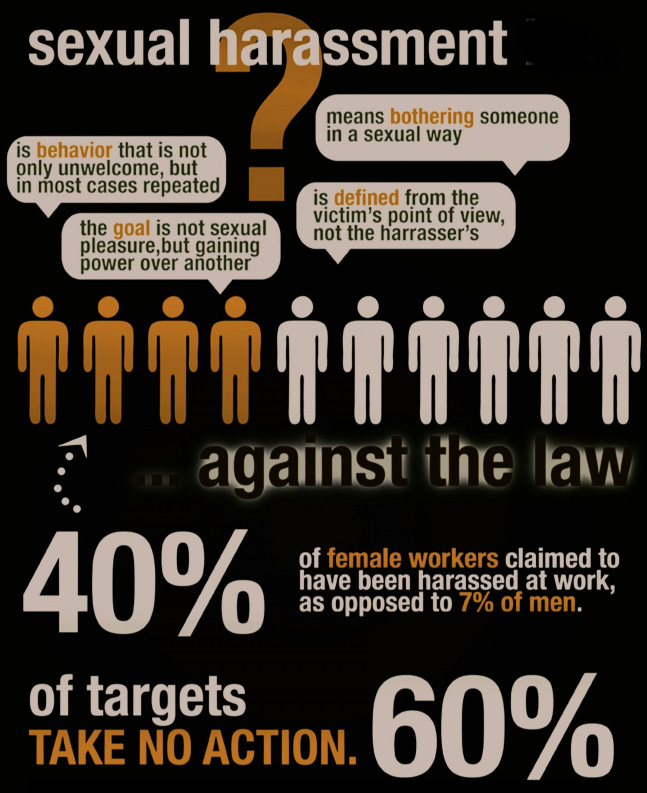When you open Twitter, what are you likely to find? These last few weeks it seems as if there has been a nonstop influx of accusations of sexual assault against individuals in the media.
In the last few weeks multiple women have come forward with sexual abuse and assault allegations against Hollywood movie moguls or actors and politicians
A viral social media campaign, Me Too, has caused a women’s movement using the hashtag “Me Too” to speak out about sexual assault.
The campaign shed light on the vast amount of sexual harassment cases that are filed, as well as the ones that have gone unregistered on a daily basis across all industries. It has gone beyond Hollywood and has also been prevalent in hotels, bars, massage parlors and in politics.
The campaign was originally started in 2007 by Tarana Burke in an effort to help young women of color who have survived sexual abuse, assault and exploitation. Burke is a program director for a Brooklyn-based organization, Girls for Gender Equality. It was one story that moved her to create Me Too to help others.
It was actress Alyssa Milano, who made the campaign go viral back in October, following the accusations against Harvey Weinstein, by tweeting out that anyone who had ever been sexually assaulted or harassed should tweet Me Too to “give people a sense of the magnitude of the problem.”
Some of the bigger names in the media who face allegations are Louis C.K., Kevin Spacey, Jeremy Piven, Charlie Sheen, Dustin Hoffman and Brett Ratner. There have also been a handful of politicians involved in accusations such as Senator Al Franken, Senate candidate Roy Moore, Michigan Representative John Conyers and former President George H. W. Bush.
Director of UTEP’s Women’s and Gender Studies, Guillerma “Gina” Nuñez-Mchiri, sees this movement as an outing of all the violence that has gone unnoticed in the movie and television industries and as an opportunity to put an end to it.
“What we’re hearing now is that this is a structural issue of sexual violence. That sexual abuse of women and children is structurally embedded in this industry, in many other industries where you need someone’s approval to get in,” she said. “You shouldn’t have to compromise your ethics and your values and your body and your mental health at the cost of your career. It shouldn’t have to be this way in Hollywood or in any other profession. It shouldn’t have to be this way.”
Allegations against film producer and executive producer Harvey Weinstein came in early October this year after the New York Times had reported that more than a dozen women accused Weinstein of sexually harassing, assaulting or raping them.
The accusations from these women are all incidents from 1980 to 2016. The list of accusers is currently over 100, with 18 of them alleging rape.
Previously, comedian and actor Bill Cosby faced public sexual assault allegations in October of 2014, with over 50 women alleging rape, sexual battery, misconduct, child abuse and/or drug-facilitated sexual assault.
Nuñez-Mchiri said that the Weinstein Effect has led to such a large number of women coming forward because it’s empowering for them to know they’re not alone.
“So women who said no, who didn’t want to take Weinstein to their rooms or meet him in these places, often times doubted themselves,” she said. “‘Maybe I should have gone with him. Maybe I didn’t get the part because I said no.’ The Weinstein Effect is now empowering more women to speak up because they’re saying, ‘look at all the women who have spoken.’ There’s a collective voice now speaking back towards this powerful force.”
She also notes that speaking up about being abused or assaulted is an opportunity to challenge the normativity of sexual violence.
“Abuse should not be the norm in these professions. It’s something that’s very redemptive when you speak and you are heard and believed. This is a time of destigmatizing the abuse by making it visible, by making it audible, by knowing that it’s not isolated but that it’s systemic. That there’s a system of power and oppression,” Nuñez-Mchiri said. “Violence is never acceptable in any profession; it shouldn’t be acceptable. That should not be the norm.”
According to a survey conducted annually by the Justice Department, the National Crime Victimization Survey (NCVS), one out of every six women has been the victim of an attempted or completed rape in her lifetime.
In college, 23.1 percent of females and 5.4 percent of males experience rape or sexual assault, according to the NCVS.
UTEP Police Chief Cliff Walsh stated that the students could report assault to the Dean of Students’ office, the Office of Student Conduct and Conflict Resolution, to Title IX coordinators, the University Counseling and Psychological Services and the University Police.
“There are many offices around campus with trained professionals who care about our students,” Walsh said. “We have a holistic approach as a campus and try to promote our students’ academic success and success in life. The police department has programming throughout the year focused on prevention and awareness.”
Charlie Gibbens, interim assistant vice president for student support and deputy Title IX coordinator, also wants students on campus to feel comfortable coming forward and asking for help if needed.
“Shame and stigma can be attached to coming forward, for both men and women,” Gibbens said. “Students can approach Counseling and Psychological Services and know that what they share with the staff is confidential and protected.”
UTEP provides several services to help students who have gone through assault or abuse and seek help.
“These situations are very multi-faceted, and there are several aspects for which students might want assistance. The Counseling and Psychological Services provides support and can connect them with resources on and off campus,” Gibbens said. “Our staff helps address the student’s needs and works with other offices on campus to help students receive the accommodations that can be part of their recovery.”
Other resources on campus include: Title IX Coordinator Sandy Vasquez, or the deputy Title IX coordinators, Dean of Students Catie McCorry-Andalis and Charlie Gibbens.
Incidents can be reported to any responsible employee, including faculty, staff and students in leadership roles. Employees are trained to get students to several offices on campus, which include: the Dean of Students Office (sa.utep.edu/dean/, [email protected], 915-747-5648), the UTEP Police Department (utep.edu/police/, [email protected], 915-747-5611), Counseling and Psychological Services (sa.utep.edu/counsel/, 915-747-5302), the Student Health and Wellness Center (915-747-5624) and the Office of Student Conduct and Conflict Resolution (sa.utep.edu/osccr/, [email protected], 915-747-8694).











